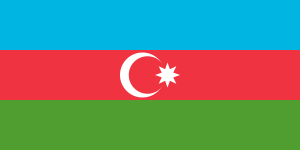Tricolour facts for kids

A tricolor (or tricolour) is a special type of flag or banner. The word "tricolor" means "three colors." These flags usually have three different colored stripes. These stripes can be placed side by side, either horizontally (left to right) or vertically (up and down). Tricolor flags are very common around the world. Many countries use them to represent their history, values, or people.
Contents
What is a Tricolor Flag?
A tricolor flag is a national symbol with three distinct colors. These colors are often arranged in bands. The bands can be equal in size or have different widths. Each color on a tricolor flag usually has a special meaning. This meaning often connects to the country's past or its hopes for the future.
Why Do Countries Use Tricolor Flags?
Many countries chose tricolor flags after important historical events. For example, the French Revolution in the late 1700s made the French tricolor flag famous. This flag used blue, white, and red. These colors stood for liberty, equality, and brotherhood. Other nations were inspired by this idea. They also adopted tricolor designs to show new beginnings or national pride.
Symbolism of Colors
The colors on a tricolor flag are not chosen randomly. Each color often represents something important.
- Red might stand for bravery, strength, or the blood shed for freedom.
- White can symbolize peace, purity, or honesty.
- Blue often represents loyalty, justice, or the sky and sea.
- Green might mean hope, nature, or growth.
- Yellow or gold can stand for wealth, sunshine, or prosperity.
These meanings can change from one country to another.
Famous Tricolor Flags
Many countries around the world use tricolor flags. Here are a few well-known examples:
The Flag of France
The French flag is one of the most famous tricolor flags. It has three vertical stripes: blue, white, and red. It became popular during the French Revolution. The blue and red are the traditional colors of Paris. White was the color of the French monarchy. Combining them showed unity between the people and the king. Over time, it came to represent liberty, equality, and fraternity.
The Flag of Italy
The Italian flag also has three vertical stripes: green, white, and red. This flag was first used in the late 1700s. The green is said to represent the country's landscapes. White stands for the snow-capped Alps. Red symbolizes the blood shed for Italy's independence. It is a powerful symbol of Italian identity.
The Flag of Germany
The German flag has three horizontal stripes: black, red, and gold. These colors have a long history in Germany. They became popular during the 19th century. Black often represented the darkness of the past. Red stood for the bloody struggle for freedom. Gold symbolized the bright future. This flag is a key symbol of modern Germany.
The Flag of Russia
The Russian flag has three horizontal stripes: white, blue, and red. This design dates back to the late 1600s. The white often represents nobility and frankness. Blue stands for faithfulness and honesty. Red symbolizes courage, generosity, and love. It is one of the oldest tricolor flags still in use.
How Tricolor Flags are Designed
Tricolor flags are simple but powerful. They use basic geometric shapes and colors. The stripes can be:
- Vertical: Like the flags of France, Italy, and Belgium.
- Horizontal: Like the flags of Germany, Russia, and the Netherlands.
Sometimes, a tricolor flag might also include a symbol in the middle. For example, the flag of Mexico has a coat of arms in its white stripe. This adds more meaning to the flag.
See also
 In Spanish: Tricolor para niños
In Spanish: Tricolor para niños
 | Stephanie Wilson |
 | Charles Bolden |
 | Ronald McNair |
 | Frederick D. Gregory |

